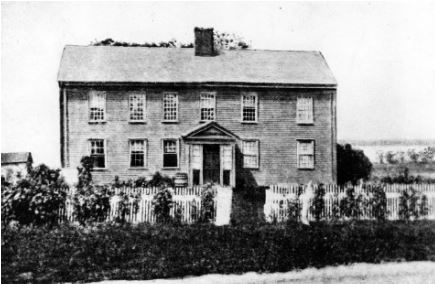How tragic is it when an innocent person goes to prison or is wrongfully convicted and sentenced to death? Our judicial system is suppose to be fair. However, there have been numerous cases in which a defendant has been pronounced guilty, but is later found to be innocent. The case of Thomas Cornell is an example of this. He was sentenced to death for murdering his own mother, Rebecca Cornell. There is no evidence for the death of Rebecca, yet I argue that a jury wrongfully convicted Thomas. What happened to Rebecca Cornell that night remains a mystery. However, it is possible that Rebecca committed suicide, and it is also possible that a group of people from the outside broke in and brutally murdered her. These plausible scenarios are, in fact, more probable than is the case for Thomas, her own son, murdering her.

Seventy-three year old Rebecca Cornell’s last moments on this Earth have had to have been one of the strangest, most peculiar moments ever. In early February 1673, Rebecca was found burnt, with flames all around her, lying some distance away from the hearth in the downstairs room of her house when Sarah, Thomas’ wife, had asked their son to ask Rebecca if she wanted something to eat. However, when he went downstairs, he noticed Rebecca’s body so badly burnt that he almost could not recognized her.1 Hours before this occurred, Thomas had spent more than an hour talking with his mother when he decided to go upstairs with his wife and kids. He had left his mother peacefully sitting by a large fireplace in her bedroom smoking a clay pipe.
According to the jury, Thomas Cornell may have murdered his mother, but there are other plausible explanations for what could have happened that night. For one, Rebecca could have committed suicide. James Moills, a good friend of Rebecca, testified that on the day of Rebecca’s death, he had noticed that Rebecca had looked ill, and did not seem herself on the day of her death. He then said that he continued to check up on her throughout the day to make sure that she was okay. Rebecca was ill the entire day on the day of her death. This meant that Rebecca could have fallen by the fireplace by herself. Ill people tend to feel clumsy due to how bad their body is at that state, resulting in less self control.2
Another possible reason for what could have happened on the night of Rebecca’s death is that she could have been murdered by a person or a group of people because two days after Rebecca’s death, John Briggs, Rebecca’s brother in law, claimed he was visited by Rebecca’s ghost, who stated, “Twice sayd, see how I was burnt with fire?” Rebecca was trying to tell her brother-in-law that her death was no accident. She failed to accuse the specific person of her death, but told Briggs that it was someone. Briggs took his testimony to the court and told the officials what he had seen. In the seventeenth century, protestants believed that the spirit of a dead person would appear if there had been “an injustice that might not be detected by other means.” They believed that such a spirit’s appearance was God’s way of ensuring that a murderer would be exposed.3 This then helps me conclude that Rebecca could have been murdered by a person or group of people, because two doors are connected to Rebecca’s bedroom. One is connected to the inside of the house while the other is connected to the outside. People from the outside had access to Rebecca’s bedroom, and if executed promptly, a number of people could have gone into Rebecca’s bedroom and murdered her and been able to escape swiftly without anyone having known. But if a person or a group of people did this, why did they do it? Could it have been because of her family’s reputation?4

Thomas Cornell Sr. and Rebecca Cornell lived in Portsmouth, Rhode Island, along with their four daughters and three sons. They formerly lived in Boston, where they had planned to stay for the rest of their lives when they arrived from England in 1627. Thomas Sr. and Rebecca Cornell bought a house and 112 acres in Boston from William Baulston, a settler who abandoned Boston to go to Portsmouth, a new settlement Rebecca’s brother, John Briggs, along with other settlers had found.5 In 1640, Thomas Sr. and Rebecca Cornell’s family decided that it was best to leave Boston and move to Portsmouth due to a number of fines Thomas Sr. had received. The fines consisted of drinking heavily at the pinnace, selling wine without a licence, and selling beer above the maximum allowable price. As soon as they arrived in Portsmouth they were welcomed, and they immediately made Thomas Sr. a freeman meaning he was able to purchase land in Portsmouth and within a year Thomas Sr. had been granted meadow land and made constable of Portsmouth. In the next couple of years, Thomas Sr. prospered in Rhode Island. The Governor Kieft of New Netherlands awarded Thomas a tract of land in 1646, seven months before the town of Portsmouth allotted him 100 acres of land where his widow would meet her tragic death more than a quarter century later.6
The jury was wrong in accusing Thomas for the murder of his own mother. However, the jury’s information about Thomas that led to his conviction was mainly based on Thomas’s relationship with his mother. Their relationship was filled with bitterness and hatred that was badly fueled with financial conflict.7 Despite Thomas living in his mother’s household, Rebecca made Thomas verbally pledge that he would pay rent to her while also providing and paying for a maid to take care of her during her remaining years.8 To continue this bitter relationship, in Rebecca’s will, all of her estate was to be equally divided among her children, whom she listed by name. All of her sons and daughters received a part of Rebecca’s property, such as clothes, valuable objects, and even one of her daughters, Mary, inherited her mother’s gold ring. All the children except for Thomas was mentioned in Rebecca’s will. Even Thomas’s first wife was mentioned in her will. This was because Thomas was the only son living with his mother, along with his wife whom Rebecca loved. Unfortunately, Thomas’ wife died a couple years after Rebecca signed her will. Shortly after, Rebecca was asked as to why she did not live with any of her other children. She said that if she knew Thomas’ wife was going to pass, she would have left years ago.9 This shows how bitter Thomas’ relationship with his mother really was. Despite their relationship, this does not mean that Thomas necessarily murdered his own mother. Almost every human beings argues with their mother, its just what we do; however, we don’t go and murder our own mothers.

Although the case of Thomas Cornell was closed, it was never solved. The jury found Thomas guilty of murdering his mother, but his decision was not certain. The testimony suggests that Thomas had the opportunity to kill his own mother; however, that doesn’t necessarily mean he did. There was no one there to see the death of Rebecca, nor was there a murder weapon found at the scene. To this day, this mystery has not found the proper reason as to what happened to Rebecca Cornell for her tragedy on February 8, 1673.
- Cornelia Hughes Dayton, “Getting Beyond ‘Who Done It,'” in Common-Place (2003): 1. ↵
- Elaine Forman Crane, Killed Strangely: The Death of Rebecca Cornell ( Ithaca: Cornell University Press, 2002), 114. ↵
- Cornelia Hughes Dayton, “Getting Beyond ‘Who Done It,'” in Common-Place (2003): 1. ↵
- Elaine Forman Crane, Killed Strangely: The Death of Rebecca Cornell ( Ithaca: Cornell University Press, 2002), 114. ↵
- Elaine Forman Crane, Killed Strangely: The Death of Rebecca Cornell ( Ithaca: Cornell University Press, 2002), 61-62. ↵
- Elaine Forman Crane, Killed Strangely: The Death of Rebecca Cornell ( Ithaca: Cornell University Press, 2002), 65. ↵
- Elaine Forman Crane, Killed Strangely: The Death of Rebecca Cornell ( Ithaca: Cornell University Press, 2002), 106. ↵
- Cornelia Hughes Dayton, “Getting Beyond ‘Who Done It,'” Common-Place (2003): 1. ↵
- Elaine Forman Crane, Killed Strangely: The Death of Rebecca Cornell ( Ithaca: Cornell University Press, 2002), 79-80. ↵



69 comments
Raul Vallejo
Reading this case made me think about how terrible it must feel to be convicted of such a harsh crime just because of lack of evidence. this reminded be very much of the west Memphis 3 were the kids were accused of the very brutal and terrible crime just because of the lack of evidence and because they were easy targets.
Sebastian Portilla
This article was very well written and had a great explanation. The story itself sounds a little fishy, there were so many different scenarios that could’ve happen. Around this time period there were so many wrongfully accused crimes. Our system wasn’t as efficient as it is now. Many people back then were unlucky about there situations and it cost them their lives.
Shea Slusser
I have read multiple cases of a victim being wrongfully accused of a crime, but this one has such little evidence, that sentencing her own son to death, is much too drastic of a punishment. Personally, I would think that the most reasonable cause of her death would be the fact she was an ill old woman, and fell by the fire by which she was sitting right next to, leading to her death. A sad story, but I feel very sorry for Thomas and the traumatic emotions he had to go through because of people accusing him of murdering his own mother.
Charli Delmonico
This case is crazy! It sounds as if there really wasn’t enough sound evidence to say, without any reasonable doubt, that Thomas was responsible for his mother’s death. His relationship with her was sad and disheartening, but that doesn’t automatically mean that he would want his mother dead. I’m surprised that he was actually convicted, and this article makes it sound plausible that Thomas was most definitely not responsible for his mother’s death.
Victoria Muller
It’s upsetting to know how many unsolvable cases end up convicting an innocent person due to the fact that they can’ find any real evidence indicating as to what really happened. Whether Thomas really did or didn’t kill her, it’s completely wrong to convict someone of murdering their own mother only for the reason of they weren’t on good terms with each other.
Rahni Hingoranee
The fact that someone “seeing a ghost” was testifiable in a court of law is evidence of what the times were really like. Being falsely accused of murder is clearly not a recently created issue, it has been happening for centuries. Capital punishment needs to be taken much more seriously in that reasonable doubt is not enough to convict someone of capital murder. The entire case wasn’t even certain, so it’s even more confusing as to how they could’ve killed someone for a crime they weren’t even sure he committed. They had barely any evidence. The article has a few grammatical errors and unnecessary repetition of ideas, but the story is definitely intriguing and something I’ve never heard about before.
Mauro Bustamante
It is easy to believe that Rebecca Cornell would’ve seen justice for her horrific death. This case is the perfect example to why our forensic investigators and out modern-day process is crucially important. This is a tragic story, but also makes us actually grateful for the modern day science that allows us to be more advanced in finding evidence at a crime scene. Among many others where they can’t find the person who actually committed the crime, is still an unsolved story. This story was very interesting in many points,
Vanessa Quetzeri
It is extremely eerie to read about someone that died in such a mysterious way; a case that would never be solved. I think it is interesting how in the seventeenth century protestants took encounters of seeing spirits into consideration- making or breaking the case. It is also very saddening that after his mother’s death, he was wrongfully convicted without any substantial evidence.
Saira Locke
This case is the perfect example to why our forensic investigators and out modern-day process is crucially important. Today, rarely in a case is no evidence at all found. There is always a trace left behind no matter the situation. It is very tragic that this particular case wasn’t able to utilize today’s technology. If this was possible at the time, it is easy to believe that Rebecca Cornell would’ve seen justice for her horrific death. It is also very saddening that the court was allowed to slander Thomas Cornell’s name with no evidence at all to do so. I can’t imagine the pain of being wrongfully convicted of your own mothers death.
Trinity Casillas
This is such a tragic story that also makes me grateful for modern forensic science. You would think the fact that Thomas checked upon his mother on the day of his death would convince some of the jury that he didn’t kill her. Another sad thing in this story is the relationship Thomas and Rebecca had. Parent and child relationships should always be special and full of love and it makes me upset whenever they aren’t.